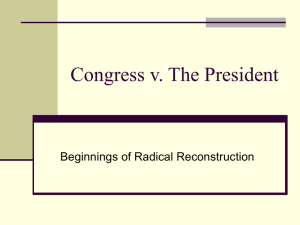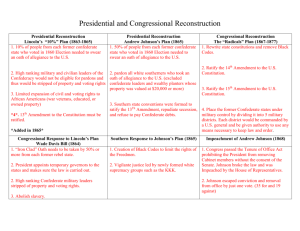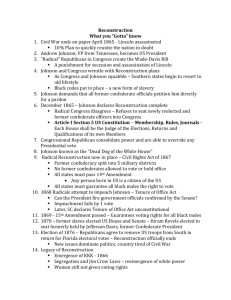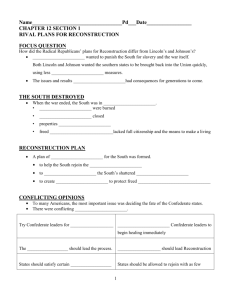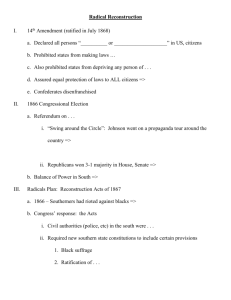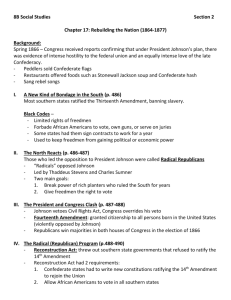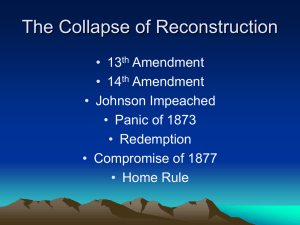Ch 12 sec 1 Outline
advertisement
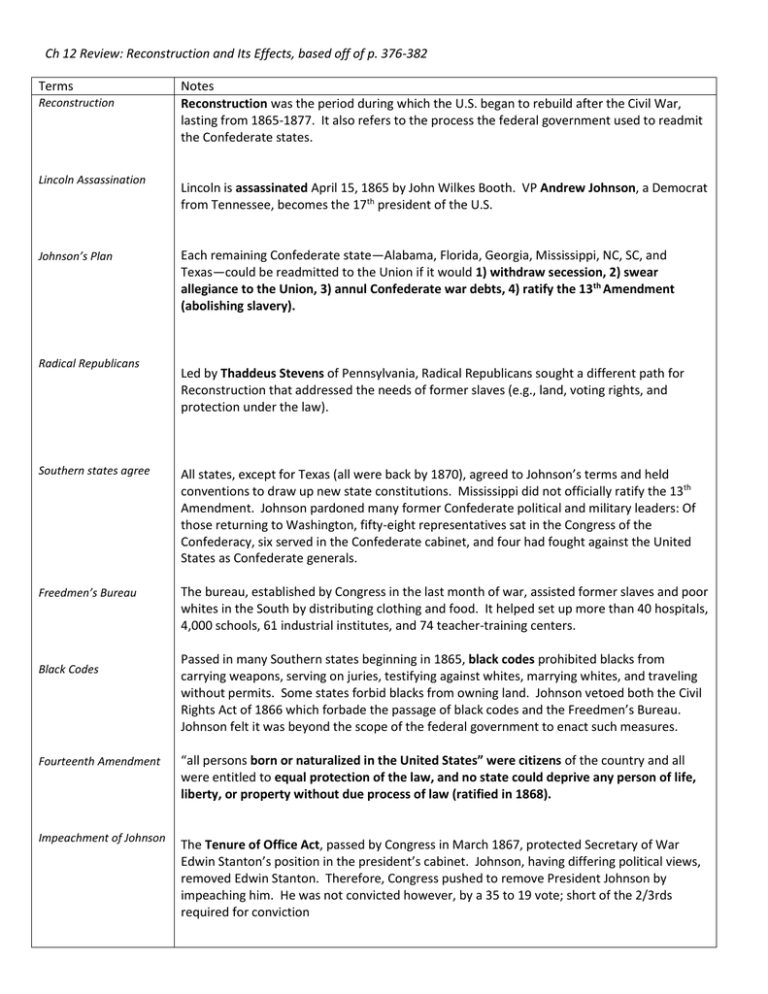
Ch 12 Review: Reconstruction and Its Effects, based off of p. 376-382 Terms Reconstruction Lincoln Assassination Johnson’s Plan Radical Republicans Notes Reconstruction was the period during which the U.S. began to rebuild after the Civil War, lasting from 1865-1877. It also refers to the process the federal government used to readmit the Confederate states. Lincoln is assassinated April 15, 1865 by John Wilkes Booth. VP Andrew Johnson, a Democrat from Tennessee, becomes the 17th president of the U.S. Each remaining Confederate state—Alabama, Florida, Georgia, Mississippi, NC, SC, and Texas—could be readmitted to the Union if it would 1) withdraw secession, 2) swear allegiance to the Union, 3) annul Confederate war debts, 4) ratify the 13 th Amendment (abolishing slavery). Led by Thaddeus Stevens of Pennsylvania, Radical Republicans sought a different path for Reconstruction that addressed the needs of former slaves (e.g., land, voting rights, and protection under the law). Southern states agree All states, except for Texas (all were back by 1870), agreed to Johnson’s terms and held conventions to draw up new state constitutions. Mississippi did not officially ratify the 13th Amendment. Johnson pardoned many former Confederate political and military leaders: Of those returning to Washington, fifty-eight representatives sat in the Congress of the Confederacy, six served in the Confederate cabinet, and four had fought against the United States as Confederate generals. Freedmen’s Bureau The bureau, established by Congress in the last month of war, assisted former slaves and poor whites in the South by distributing clothing and food. It helped set up more than 40 hospitals, 4,000 schools, 61 industrial institutes, and 74 teacher-training centers. Black Codes Passed in many Southern states beginning in 1865, black codes prohibited blacks from carrying weapons, serving on juries, testifying against whites, marrying whites, and traveling without permits. Some states forbid blacks from owning land. Johnson vetoed both the Civil Rights Act of 1866 which forbade the passage of black codes and the Freedmen’s Bureau. Johnson felt it was beyond the scope of the federal government to enact such measures. Fourteenth Amendment “all persons born or naturalized in the United States” were citizens of the country and all were entitled to equal protection of the law, and no state could deprive any person of life, liberty, or property without due process of law (ratified in 1868). Impeachment of Johnson The Tenure of Office Act, passed by Congress in March 1867, protected Secretary of War Edwin Stanton’s position in the president’s cabinet. Johnson, having differing political views, removed Edwin Stanton. Therefore, Congress pushed to remove President Johnson by impeaching him. He was not convicted however, by a 35 to 19 vote; short of the 2/3rds required for conviction Grant elected as President in 1868 War hero Ulysses S. Grant, Republican, won the 1868 election against New Yorker, Horatio Seymour, though the popular vote was nearly 50/50. The African-American vote was likely the deciding factor. Fifteenth Amendment As a push to ensure black suffrage moving forward, the Fifteenth Amendment, stating that no one can be kept from voting because of “race, color, or previous condition of servitude”is ratified in 1870. Other Notes

